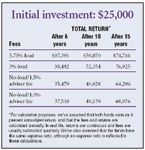Article
Investing: Paying commissions can pay off
Some of the knocks against financial professionals who work on commission may be simply unfair.

Many fee-only professionals claim that they alone are objective and free from conflict-of-interest when it comes to investment recommendations. Many members of NAPFA (National Association of Personal Financial Advisers) say that advisers who earn commissions on mutual funds or other financial products such as life insurance are likely to steer you to those that earn them the highest commissions, rather than what's best for you.
It's true, advisers who earn commissions usually select mutual funds with a front-end load (sales charge), though they'll use no-load funds on occasion if a client requests them. (Reminder: If you're buying your own funds without an adviser, there's little reason to ever pay a front-end load.)
Here's why: Let's say two mutual funds have identical expenses and the same annualized returns. One has a 5.75 percent front-end commission and the other has no load, but you'll pay a 1 percent annual adviser fee until you sell your investment.
For the first few years, you have less money in the load fund (since the commission is subtracted immediately from your investment). But after about six years, your net assets in the two funds will be virtually equal. The front load is in effect "paid off," but you'll continue to pay the fee-only financial adviser 1 percent of assets every year. At the end of 10 years, the load fund is slightly ahead. At 15 years, the gap is wider: You're ahead with the load fund.
Still, if your load fund no longer suits your portfolio, and you ditch it in less than about six years, you'd be better off with a fee-only arrangement. It's somewhat like deciding whether to buy or lease a car: Buy if you're going to hold it years beyond paying it off; lease if you're going to sell it in three years or less.
Will the lure of bigger commissions really sway an adviser to steer you toward an inferior or inappropriate investment? It's possible. But when choosing an adviser, the way he or she gets paid is just one of several factors to consider, including credentials, experience, references.
Ultimately, you want to team up with someone who cares about and works toward your financial well-being. That type of expertise and character may well be beyond the fee vs commission debate.





